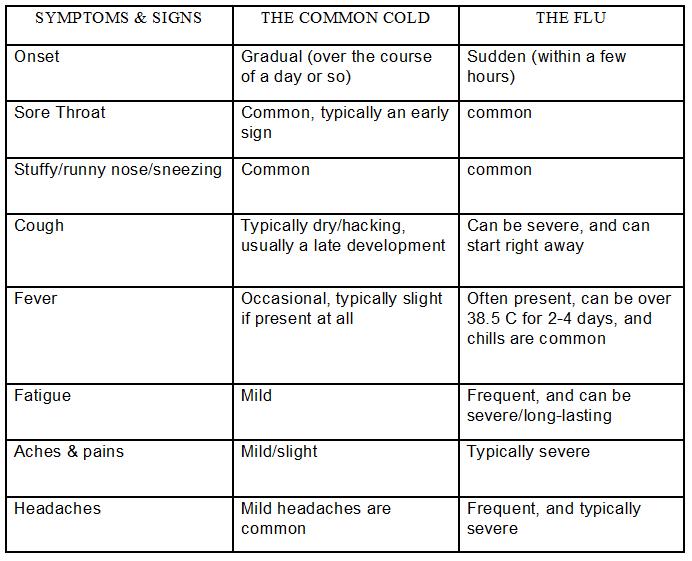My workdays at the clinic have been pretty full of mucus lately. Just about everyone who walks through the door is coughing or sneezing or clutching a sore throat or some variation of the above. And I’ve noticed, as always, a whole lot of confusion when it comes to colds and the flu.
![]() What To Feed Your Kids When They Have The Flu
What To Feed Your Kids When They Have The Flu
So what’s the difference between a cold and the flu? How do you know what you, or your kids, have? And...does it really matter, anyway?
Well, in fact it does matter. Because with a cold, you can (and should) battle it out on your own. For a little while, anyway. If your symptoms worsen or persist, you should come in. (As a guideline, a cold should run its course in about 7-10 days.) The flu, however, is different, and if you come in quickly, we may be able to prescribe an antiviral medication that can help your immune system.
Okay, so to help clear things up, I’ve created a handy little chart. Each symptom on the left will manifest differently, whether it’s a cold or the flu. Here’s how things break down:

Make sense?
Basically, the flu is an entirely different animal than a cold. While we all get colds from time to time, and it kind of stinks but you muddle through...the flu YOU DO NOT WANT. It will knock you on your ass. Many adults have never actually had the flu, so they don’t know just how bad it can be. But once you do get it...you know.
![]() How You Can Prevent Colds and The Flu In The First Place
How You Can Prevent Colds and The Flu In The First Place
So how about treatment? Whether it’s a cold or the flu, there are lots of home remedies that will help ease your symptoms while you’re immune system is going to war. From zinc to vitamin C to chicken soup, read all my recommendations here.
Note I have not mentioned anything about antibiotics. That’s because both the flu and the common cold are caused by VIRUSES. And viruses do not respond to antibiotics. Now, sometimes, either one of these viruses can lead to a secondary bacterial infection. Meaning: bacteria take advantage of the fact that your immune system is busy fighting the virus, so the bacteria sets up camp in a specific body part. Like your chest, for example (this is pneumonia) or your ears (middle ear infection).
Signs you may have a secondary bacterial infection: after you’ve been sick with a virus for a little while, instead of gradually getting better, you suddenly take a turn for the worse. You spike a fever. You start getting very specific symptoms, like an earache, or one-sided sinus pressure. This is when you go see your doctor. Also, if you've got a persistent sore throat and fever only (none of the other cold/flu symptoms) and it's like razor blades when you try to swallow—you should see your doc to rule out that lovely thing known as Strep Throat. Which is a bacterial infection, and does require antibiotics.
So how about you—have you ever had the flu? Any home remedies you swear by?
Stay healthy, everyone.